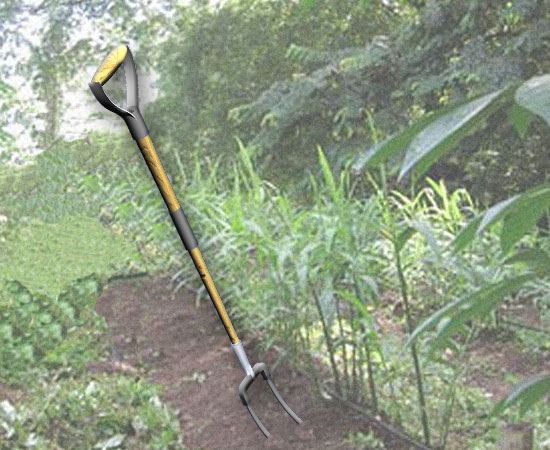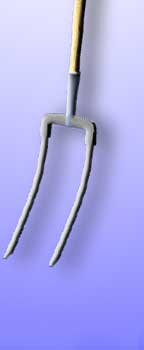| |
|
|
 Both of these tines attach parallel to each other Both of these tines attach parallel to each other
upon, and in perpendicular alignment to, the endpoints
of another stainless steel
rod, and this other rod measures approximately
four inches in length
by one inch in diameter
(4” x 1”). The center of
this base rod features
an extending neck of
an approximate three-
inch length and one-
inch diameter (3” x 1”).
Fitting within this neck is a handle made of treated wood and of four-foot length by one-inch diameter (4' x 1”) size. This handle attaches within the extending neck of the tine base head by screw(s).
Features
- Base head of stainless steel rod
- With two (2) tines attached to base rod of approximately
4” x 1” size
- Each tine measuring 10 1/2 ” x 1/2 ” and extending at 30º
angle of curvature
- Neck of approximately 3” x 1” size extending from base
rod at opposite side of tines
- Handle of 4' x 1” size and made of treated wood extending
from neck
- Screw(s) for attachment of handle to neck
Benefits
- Removes weeds from lawns and gardens
- Can be applied to small area
- Doesn't damage area around weeds
- Of size to allow application upon small area without
unnecessarily piercing surrounding area
- Projects in depth needed to remove weeds by roots
- Performs better than four-tined hoes and pitchforks
- Removes weeds easier than by hand
- Removes weeds with less physical stress than by hand
- Removes weeds better than by hand
- Allows weeds to be removed while standing instead of
while kneeling
- Removes weeds safer than by chemicals
- Removes weeds faster than chemicals
- Removes weeds without damaging surrounding area,
unlike chemicals
- Removes weeds with more success in single application
than chemicals
- Removes weeds much less expensively than chemicals
- Can appeal to a very large consumer group
- Can meet the particular wants and desires of this
consumer group
- Can join a very successful product line
- Can easily and quickly achieve profitability
|
|
|
|





 Both of these tines attach parallel to each other
Both of these tines attach parallel to each other